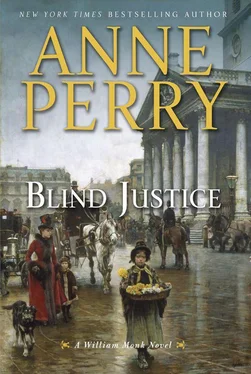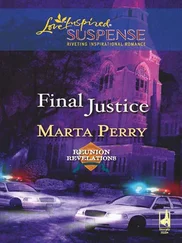Anne Perry - Blind Justice
Здесь есть возможность читать онлайн «Anne Perry - Blind Justice» весь текст электронной книги совершенно бесплатно (целиком полную версию без сокращений). В некоторых случаях можно слушать аудио, скачать через торрент в формате fb2 и присутствует краткое содержание. Жанр: Исторический детектив, на английском языке. Описание произведения, (предисловие) а так же отзывы посетителей доступны на портале библиотеки ЛибКат.
- Название:Blind Justice
- Автор:
- Жанр:
- Год:неизвестен
- ISBN:нет данных
- Рейтинг книги:4 / 5. Голосов: 1
-
Избранное:Добавить в избранное
- Отзывы:
-
Ваша оценка:
- 80
- 1
- 2
- 3
- 4
- 5
Blind Justice: краткое содержание, описание и аннотация
Предлагаем к чтению аннотацию, описание, краткое содержание или предисловие (зависит от того, что написал сам автор книги «Blind Justice»). Если вы не нашли необходимую информацию о книге — напишите в комментариях, мы постараемся отыскать её.
Blind Justice — читать онлайн бесплатно полную книгу (весь текст) целиком
Ниже представлен текст книги, разбитый по страницам. Система сохранения места последней прочитанной страницы, позволяет с удобством читать онлайн бесплатно книгу «Blind Justice», без необходимости каждый раз заново искать на чём Вы остановились. Поставьте закладку, и сможете в любой момент перейти на страницу, на которой закончили чтение.
Интервал:
Закладка:
“It’s quite lovely,” he said instead, looking at the little painting. “I think he could well become professional, don’t you?”
Henry smiled. “Actually it’s a ‘she,’ so I doubt it. But I’m delighted you like it. I’ll have it framed, I think. Now, what kind of cake would you like with tea?”
“Fruitcake, thank you,” Oliver replied, knowing it was also Henry’s favorite.
Henry looked up and caught Oliver’s troubled face. “What is it?”
“Ballinger’s photographs,” Oliver replied. “I … I’m still undecided whether I should destroy them or not.”
Henry thought for a few minutes before speaking.
Oliver waited.
“I presume you have weighed the arguments on either side, and reached no conclusion,” he said finally.
“I’m not sure that it’s quite that simple,” Oliver answered frankly. “To destroy them would be irrevocable. I suppose I’m reluctant to do that. What if a situation arises where, with them, I could right a great wrong, but I had thrown that opportunity away because I was too cowardly to deal with the responsibility of keeping them? I would have to face the fact that I destroyed a precious means of helping make a difference. Ballinger himself first used them to save countless lives after all.”
There was no joy in Henry’s face, no light of agreement.
“To begin with, yes,” he said. “But I think it’s more important to remember where he ended up.”
“Are you saying I should destroy them?” Oliver asked.
Henry regarded him slightly critically. “No, I’m not. It is too big a decision for you to allow anyone else to make for you. You are dealing with an immense power. Be very careful.” He took a deep breath and let it out in a sigh. “Whatever you do there is a terrible risk. That is no doubt what Ballinger intended.” He smiled bleakly; then his face lifted with gentleness. “I’m sorry.”
CHAPTER 3
The summer weather was beautiful. Rathbone stood by the window in his chambers and watched the traffic pass below him. The sun glinted on harnesses and the shining coats of the horses as a brougham went by, coachman sitting upright. In the carriage two ladies held colored parasols, the frilled edges fluttering in the breeze.
There was a brief knock on the door. As he turned to respond, the door opened and his clerk came in, his face somber.
“Yes, Patmore?” Rathbone said, curious. Usually Patmore would begin to speak as soon as he had closed the door. Obviously this was a matter of some gravity.
“There is a new case added to your docket, Sir Oliver,” he said quietly, then cleared his throat. “I think you might like some warning before it actually comes to court.”
Rathbone was intrigued already. “Scandal?” he asked. “Something we need to handle delicately?” He was used to such things.
“Yes, sir, but not in the usual way,” Patmore replied. “It’s … it’s really very nasty.”
“Things usually are if they find their way to the Old Bailey,” Rathbone observed a little drily. “Murder?”
“No, sir. As far as I know, nobody was physically harmed. It’s all quite literally about money.”
Rathbone almost lost interest immediately. Greed was one of the most boring motives for breaking the law. “Then why do you think I ought to be warned before I consider it more seriously?” he asked.
“You might wish to find a way to pass it on to someone else, sir,” Patmore replied, explaining it as if to someone slow of understanding. “I think it will get very ugly, and whatever the verdict, it will offend people we would prefer not to.”
Rathbone’s attention was fully engaged now. He recalled the conversation at Ingram York’s dinner table. “What on earth is so sensational in a case of greed?” He said carefully, not wanting to assume the case was anything too extraordinary. “We see them every day.”
“Not when the accused is a churchman and the victim is apparently his flock, sir.”
Patmore had a sense of irony that had not escaped Rathbone, but he was still far from used to it.
“I see.” Rathbone exhaled slowly.
“It will be unpleasant and require a great deal of tact,” Patmore continued. “I rather fancy you have been handed it because everyone else would prefer to watch from the sidelines, preferably far enough away for flying mud not to attach itself to them.”
“If anyone can counsel you to curb your opinions, Patmore, you might consider it seriously, for your own survival-but please never do it for mine. I should miss your frankness. Now tell me more specifically what the accusation is against this churchman.”
Patmore inclined his head, by way of accepting what he took to be a compliment, as indeed it was. “Mr. Abel Taft has been accused of defrauding his congregation out of several thousands of pounds, sir,” he answered. “In fact, the amount named would be sufficient to buy a row of quite respectable houses. Half a street of them.”
“Several thousands?” Rathbone said in disbelief. “How on earth could he swindle his congregation out of so much without their knowledge? And where on earth is his church that his parishioners had that much to give?” He was quite certain now that this was the case that York had mentioned.
“That is rather the issue, sir,” Patmore remarked. “It has been given, allegedly, by ordinary men and women, out of their savings, in the belief that it was going to the starving and the homeless.”
“And it was not?” Rathbone felt his anger rising.
“Allegedly not, sir. Rather more than stated was going to a very nice savings account, not to mention a high standard of living for Mr. Taft himself, and of course his young and very appealing family.”
“I begin to see what you mean about the possibility of this getting ugly,” Rathbone conceded. “We had better ensure that the evidence is more than good and that both lawyers know what they are doing. Mr. Taft is represented, isn’t he?”
“Oh, yes, sir. By Mr. Blair Gavinton. Having him appear in your court will be quite an experience for you.”
“I don’t like the way you say that, Patmore.”
“I could say it a lot worse, sir, I promise you.”
“Exactly what is wrong with Mr. Gavinton?”
“Greasy, sir. There’s just something about him, but the minute you put your finger on it, it slips away.”
“Indeed. And what do you know about Mr. Abel Taft? I’ve never heard of him.”
“Does very well, sir,” Patmore replied, all expression very carefully ironed out of his voice. “I’ve taken the liberty of looking him up. He has a nice house, very handsome wife, two young daughters just about the right age to be looking for husbands. Dresses very well, does Mr. Taft, at least so I hear. Dines even better. Belongs to some good clubs too. I wouldn’t care to pay his tailor’s bill.”
“Interesting,” Rathbone conceded. “Do you know who is prosecuting this case?”
“No, sir, not yet. But I have made discreet inquiries. He’ll have to be very good indeed to catch Mr. Gavinton out.”
“We must assume the police have concrete evidence, or they would not be wasting everyone’s time or risking looking incompetent.”
Patmore inclined his head very slightly. “Precisely, sir. I shall keep you informed. I believe we have three weeks yet before the trial begins. Rather depends on the Warburton case, and how long that takes.”
“Not three weeks, please heaven!” Rathbone exclaimed.
“Indeed not, sir.”
Rathbone gave him a wry look, and Patmore withdrew, his expression unreadable.
After the door had closed Rathbone stood still for quite some time. This had to be the case York had been referring to. He had said it would require considerable legal skill to keep it under control and make it clear enough for justice to be truly served. Was there a reason York had brought it up in the first place? Had he wanted the church exonerated? Or did he consider this to be a sect richly deserving a setback?
Читать дальшеИнтервал:
Закладка:
Похожие книги на «Blind Justice»
Представляем Вашему вниманию похожие книги на «Blind Justice» списком для выбора. Мы отобрали схожую по названию и смыслу литературу в надежде предоставить читателям больше вариантов отыскать новые, интересные, ещё непрочитанные произведения.
Обсуждение, отзывы о книге «Blind Justice» и просто собственные мнения читателей. Оставьте ваши комментарии, напишите, что Вы думаете о произведении, его смысле или главных героях. Укажите что конкретно понравилось, а что нет, и почему Вы так считаете.












